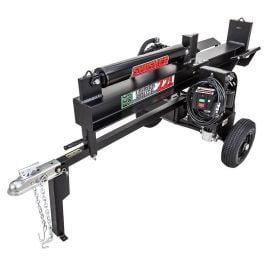I'm looking to buy my first splitter, and finding conflicting information about how big of a splitter I need. I would very strongly prefer something electric (I've completely managed to avoid small engines around the homestead so far), but only if it will actually split the logs I have. I was looking at the Boss Industrial 7 ton (the 10 ton seems perpetually out-of-stock), and I'm hoping to split primarily oak and hickory, up to about 14" in diameter (though mostly smaller) and no more than 16" in length. The logs are all pretty straight - very few knots or anything in them. I rented a splitter last year that had no trouble, but it was a 22 ton gas version, so I'm not sure that that tells me much. Folks who've used an electric splitter - is this plausible? Is the Boss Industrial a decent option?
How Many Tons Do I Need
- Thread starter jalmondale
- Start date
-
Active since 1995, Hearth.com is THE place on the internet for free information and advice about wood stoves, pellet stoves and other energy saving equipment.
We strive to provide opinions, articles, discussions and history related to Hearth Products and in a more general sense, energy issues.
We promote the EFFICIENT, RESPONSIBLE, CLEAN and SAFE use of all fuels, whether renewable or fossil.



![[Hearth.com] How Many Tons Do I Need [Hearth.com] How Many Tons Do I Need](https://www.hearth.com/talk/data/attachments/293/293052-0cdb5383dffc7899210135d90cbaf70c.jpg?hash=w7yC0lU-Ey)
![[Hearth.com] How Many Tons Do I Need [Hearth.com] How Many Tons Do I Need](https://www.hearth.com/talk/data/attachments/293/293053-92ee917e151fc9df0256e33d00d67117.jpg?hash=uR8MThyzRB)